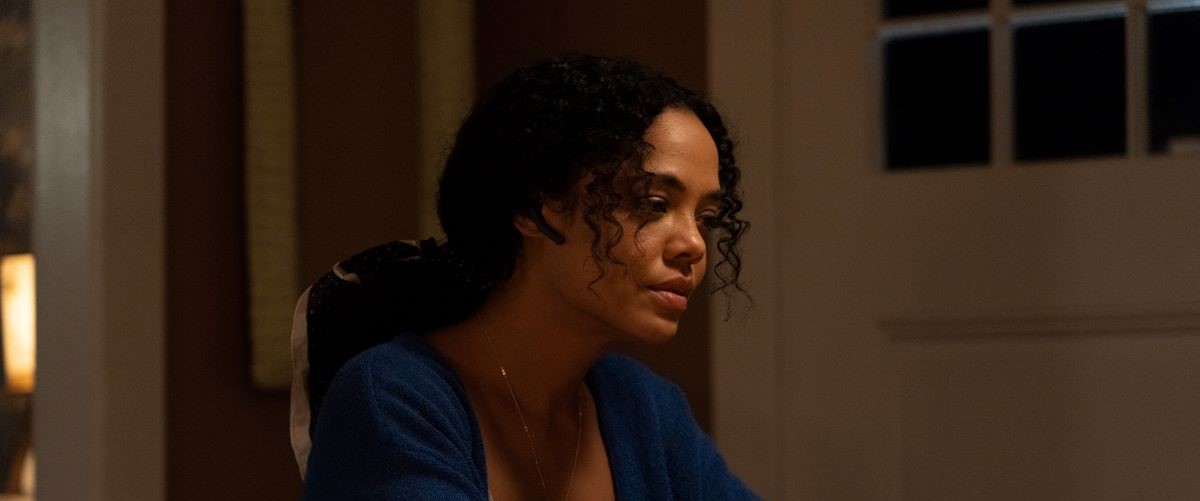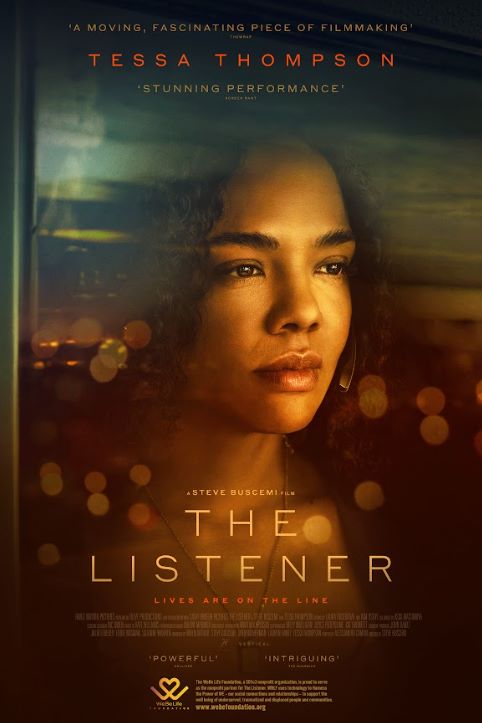To call “The Listener” minimalist would be an understatement. Shot a year into the pandemic, it played film festivals in 2022 and is only now getting a proper release. Once you watch it, you’ll see why it wasn’t treated as a potential box office bonanza. It’s sensitive, subtle, and restrained, and asks more of the audience than it’s typically willing to give.
Written by Alessandro Camon, author of the screenplays for “The Messenger,” “The Cooler,” and “Thank You for Smoking,” this is a one-woman show, kind of. Tessa Thompson stars as a phone counselor named Beth who takes calls from troubled people over the course of a night. The callers are played by a mix of well-known and should-be-better-known actors, including Alia Shawkat, Rebecca Hall, Margaret Cho, Jamie Hector, and Logan Marshall-Green. You hear their voices but never see their faces, only the reactions of Beth, who mostly listens but sometimes chimes in to offer an empathetic comment or bit of helpful advice, or head off comments that seem intrusive or inappropriate. The voice performances are all excellent, very naturalistic, and Thompson proves she has the stuff to anchor an entire movie by herself, commanding the viewer’s full attention even when she’s just sitting silently in a chair listening to an unseen person talk.
The result plays like a relaxed, intuitive, mirror-world equivalent of the great and under-seen Oliver Stone movie “Talk Radio,” starring Eric Bogosian and based on his play, which was about a bombastic late-night talk show host inciting, insulting, and otherwise battling with callers. What the movies have in common, besides an “all in one night” structure, is a sense that they’re examining the United States’ body politic at the times in which they were made. The energy here is quieter, more empathetic and intuitive, more “feminine,” at least in contrast to the hairy-chested alpha-dog verbal attacks of “Talk Radio,” but it’s a shock to realize that a lot of the ills that Stone and Bogosian diagnosed have not gone away, only mutated. It also feels like it could be a companion piece to the Sidney Poitier film “The Slender Thread,” about workers at a suicide hotline who try to prevent a woman from killing herself.
Beth’s callers are lonely and feel abandoned and/or oppressed by society. There’s a sardonic veteran of the Iraqi and Afghanistan wars who is traumatized by his experience and tossed aside by his government and whose marriage is in trouble. “Try explaining that to the missus, how much you miss sleeping in a room full of dudes and guns,” he says. There’s a young woman who is verbally gifted (Beth tells her she sounds like a poet) but who is mentally ill and not taking her meds because her comedian partner dumped her and she lost her health insurance. She’s feeling paranoid and beleaguered and is upset by pretty much everything. “I have snakes for bones,” she says, and tells Beth that she calls her own brain “Brian…because it’s scrambled.” There’s a young homeless woman who ran away from home and now lives in “a cozy two-person tent.” The scariest caller is a young man whose hatred of women is apparent even before he confirms it to Beth and starts trying to breach the parameters she insists upon.
One of the aspects that’s most fascinating in retrospect is how little information the movie feels it needs to give the audience in order to create a mood and a story. Although it’s based on an original screenplay, it feels like a filmed theater piece, adapting a production of the sort of play that premieres in a small venue and doesn’t require complicated sets.
It’s judicious with exposition, too. You don’t know exactly where Beth lives or whether there are any other living beings in the place with her until the movie decides to tell you. You also don’t know exactly what sort of service Beth works for. She tells one caller that not everybody who reaches out to her is suicidal, although they all sound like they’re potentially on the edge. (One waves away Beth’s concern by stating, “I don’t have an urge to kill myself, I’m just looking at it objectively.”) Most people just call to talk. Beth doesn’t fill out any forms or submit reports on a computer. You don’t see her take written notes. There are a couple of cuts to her notebook revealing that she makes drawings while she talks to people.
Thirty years ago, when Buscemi was starting out as a filmmaker and had not hit the peak of his fame on “The Sopranos” (a series for which he acted as well as directed) a movie like “The Listener” might’ve had a slow-rollout, city-by-city art-house run before finding a larger audience on home video rather than receiving a perfunctory release in a small number of theaters while also being instantly made available to stream and having to fight to be noticed by the public amid a sea of other options. That’s too bad: I bet it plays more powerfully on a big screen than on a laptop or phone because of the way that a theater encourages audiences to concentrate and give themselves over to an experience rather than standing outside of it. This is the kind of film that needs to be listened to, with one’s eyes as well as one’s ears.




















